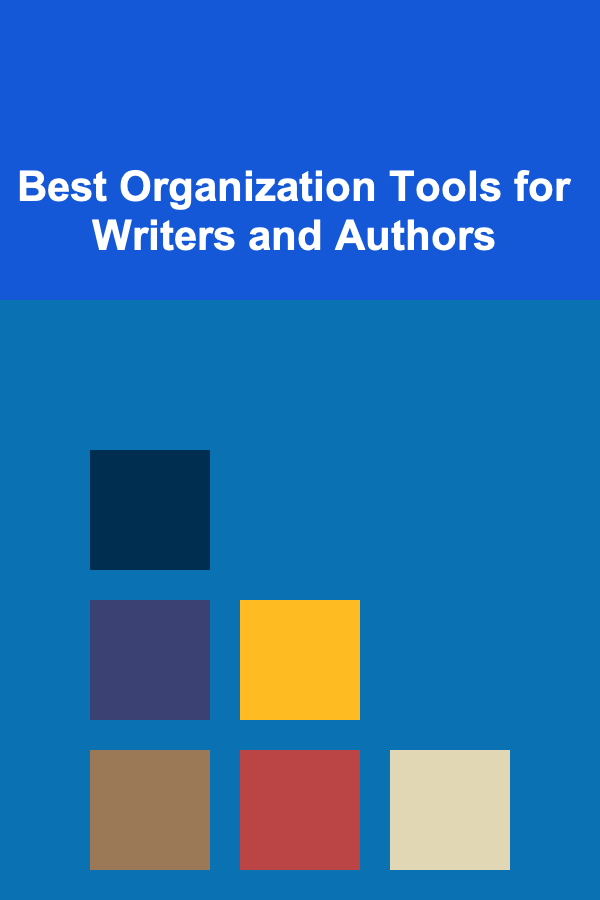
Best Organization Tools for Writers and Authors
ebook include PDF & Audio bundle (Micro Guide)
$12.99$6.99
Limited Time Offer! Order within the next:

Writing can often feel like an overwhelming process---juggling ideas, research, outlines, drafts, and final edits. With the sheer number of tasks involved in writing, staying organized is essential to achieving productivity and maintaining creativity. Whether you're a seasoned author working on a novel or an aspiring writer crafting blog posts, using the right tools to stay organized can make all the difference.
This article will explore the best organization tools available for writers and authors. From project management to writing and editing tools, these resources will help you streamline your workflow, increase productivity, and focus on what truly matters---your writing.
Project Management Tools for Writers
Writers often need to balance multiple tasks at once---organizing research, managing deadlines, tracking writing progress, and collaborating with editors or other contributors. Project management tools help organize these tasks into manageable chunks. These tools not only ensure that deadlines are met but also help maintain a clear roadmap throughout the writing process.
1.1 Trello
Trello is a popular project management tool that allows writers to organize their writing projects visually. It uses boards, lists, and cards to represent different stages of your work. Writers can create separate boards for each project, with lists that detail the various phases of the project---such as research, outline, first draft, revisions, and final edits.
Key Features:
- Visual Layout: Easy-to-use Kanban-style board to organize tasks.
- Customizable: You can add checklists, due dates, labels, and attachments to cards.
- Collaboration: Share boards with collaborators or editors and track progress.
- Integration: Sync with other tools such as Google Drive, Slack, and Evernote for added functionality.
Trello's visual nature is particularly useful for writers who need a clear overview of their project and want to see how tasks are progressing at a glance. It's especially effective for longer projects like novels, research papers, or multi-part articles.
1.2 Scrivener
Scrivener is a writing software designed specifically for long-form writers, such as novelists, screenwriters, and academics. It allows writers to organize their work in a non-linear way. You can break your manuscript into manageable sections, drag and drop them, and even rearrange chapters or scenes to suit your workflow.
Key Features:
- Corkboard View: Organize and visualize your manuscript with virtual index cards.
- Research Storage: Store notes, web clippings, images, and more within the project.
- Outlining Tools: Create detailed outlines for your manuscript with customizable templates.
- Distraction-Free Mode: Focus on writing without distractions, with tools that allow for a seamless writing experience.
Scrivener is ideal for writers who like to break their work into smaller chunks and need tools to manage complex projects with lots of moving parts.
1.3 Notion
Notion is a versatile tool that can be used for almost anything---notes, task management, databases, and more. It's a great tool for writers who want to centralize their research, notes, and tasks in one place. Notion allows you to build custom workflows and templates to suit your personal writing process.
Key Features:
- Customizable Templates: Create your own writing templates, project plans, and task lists.
- Database Management: Organize research, character sketches, and plot points in a database format.
- Collaboration: Share your Notion workspace with collaborators or editors.
- Multimedia Integration: Embed images, links, videos, and other media to enhance your writing process.
Notion's flexibility makes it a favorite for writers who prefer an all-in-one solution for notes, project management, and document organization.
Writing and Drafting Tools
Once the planning and organizing are complete, the next step is writing. Drafting and structuring your content is where many writers encounter roadblocks. Writing tools help eliminate distractions, provide organization features like templates, and improve your focus, ensuring that the writing process is as smooth as possible.
2.1 Google Docs
Google Docs is a widely used cloud-based writing tool that offers real-time collaboration and seamless access across devices. Whether you're writing a short story or a full-length novel, Google Docs provides all the essential writing features with the added benefit of online accessibility.
Key Features:
- Cloud-Based: Access your documents from any device with an internet connection.
- Collaboration: Share documents with others and collaborate in real-time with editors or co-authors.
- Revision History: Track changes and restore previous versions of your document.
- Add-ons: Enhance Google Docs with add-ons like Grammarly or Thesaurus to help improve writing quality.
Google Docs is perfect for writers who need a simple, user-friendly writing tool that supports collaboration and cloud storage.
2.2 Hemingway Editor
The Hemingway Editor is a unique tool designed to help writers improve their writing by making it clearer, more concise, and easier to read. It analyzes your writing and highlights areas that can be improved, such as overly complex sentences, passive voice, and adverbs.
Key Features:
- Readability Score: The tool provides a readability score based on the Flesch-Kincaid formula.
- Suggestions for Improvement: Hemingway highlights sentences that are hard to read and offers suggestions for simplifying them.
- Distraction-Free Mode: Focus purely on your writing, without worrying about formatting or other distractions.
- Export Options: You can export your work in multiple formats, including plain text, HTML, and Word.
The Hemingway Editor is an excellent tool for authors who want to improve the clarity and readability of their work, making it an ideal choice for writers focusing on crafting simple, direct prose.
2.3 Ulysses
Ulysses is a writing app designed for Mac and iOS users. It offers a distraction-free writing environment combined with powerful organizational tools. Ulysses is perfect for long-term writing projects, such as novels, essays, or research papers, allowing you to organize and export your work effortlessly.
Key Features:
- Markdown Support: Write using Markdown for easy formatting and seamless export.
- Library Organization: Organize your writing into folders and groups for easy navigation.
- Syncing Across Devices: Sync your writing seamlessly across multiple Apple devices.
- Exporting Options: Export your writing to multiple formats, including PDF, ePub, and Word.
Ulysses is ideal for authors who prefer a minimalist writing environment with robust organizational and export options.
Research and Note-Taking Tools
Research is often the backbone of any well-written piece of work. Whether you're writing a novel, a historical article, or a technical paper, having easy access to your research is crucial. Research and note-taking tools help writers collect, store, and organize information for later use.
3.1 Evernote
Evernote is one of the most popular note-taking apps available, allowing writers to collect and organize all kinds of information. From web clippings to voice notes, Evernote lets you store everything in one place and syncs your notes across multiple devices.
Key Features:
- Web Clipper: Save web pages, articles, and research material directly into Evernote.
- Tagging System: Organize notes with tags for easy retrieval.
- Search Functionality: Search through your notes using keywords, even within images and scanned documents.
- Collaboration: Share notes and collaborate with others on shared projects.
Evernote is ideal for writers who want a central place to store and organize research, ideas, and notes.
3.2 Mendeley
Mendeley is an academic reference manager that helps writers keep track of research papers, citations, and bibliographies. While it's widely used by scholars and researchers, Mendeley can be just as useful for writers working on fiction or nonfiction projects that require extensive research.
Key Features:
- PDF Organization: Store and organize PDFs, research papers, and articles in one place.
- Citation Generator: Automatically generate citations and bibliographies in various formats.
- Collaboration: Share research papers and collaborate with other researchers or writers.
- Cross-Platform Syncing: Sync your research across devices and platforms.
Mendeley is especially beneficial for writers working on academic or non-fiction projects that require accurate citations and organized research.
3.3 OneNote
Microsoft OneNote is another popular note-taking tool that offers robust organizational features. You can create different notebooks for each project, and within those notebooks, you can organize your ideas, research, and drafts using tabs and pages.
Key Features:
- Notebook Organization: Create separate notebooks for different writing projects and organize notes within them.
- Collaboration: Share notebooks with co-authors, editors, or collaborators.
- Multimedia Support: Add images, audio recordings, and links to your notes.
- Cross-Platform Syncing: Sync your notebooks across all devices.
OneNote is a great choice for writers who need a flexible, multimedia-friendly note-taking solution.
Editing and Proofreading Tools
Once your draft is complete, it's time to edit and proofread. Good editing tools can help you improve your writing, catch mistakes, and refine your work. These tools are vital for ensuring that your writing is polished and error-free.
4.1 Grammarly
Grammarly is a widely used writing assistant that checks for spelling, grammar, punctuation, style, and even tone. It's an essential tool for any writer who wants to improve the quality of their writing without missing errors.
Key Features:
- Grammar and Spell Check: Automatically detect grammar, punctuation, and spelling errors.
- Plagiarism Detection: Ensure your writing is original by checking it against billions of web pages.
- Style Suggestions: Get suggestions for improving readability, tone, and clarity.
- Integrations: Works with Google Docs, Microsoft Word, and other writing platforms.
Grammarly is particularly useful for writers who need an easy-to-use tool for proofreading and editing.
4.2 ProWritingAid
ProWritingAid is a comprehensive editing tool that goes beyond basic grammar and spelling checks. It offers in-depth reports on writing style, structure, and readability, helping writers refine their work and improve their writing skills.
Key Features:
- Style and Structure Reports: Analyze sentence structure, overused words, and readability.
- Writing Insights: Receive feedback on pacing, dialogue, and overall narrative flow.
- Integration: Works with Microsoft Word, Google Docs, Scrivener, and more.
- Plagiarism Checker: Check for plagiarism across multiple sources.
ProWritingAid is an excellent tool for writers who want more detailed feedback on their writing and want to improve their overall style.
4.3 AutoCrit
AutoCrit is an editing tool that focuses on the specifics of fiction writing. It's particularly useful for novelists, offering detailed analysis of pacing, dialogue, and character development. AutoCrit helps writers identify areas of their work that might need improvement.
Key Features:
- Fiction-Specific Analysis: Tailored specifically for novel writers with tools to analyze pacing, dialogue, and character arcs.
- Style Reports: Get in-depth reports on your writing style, including word choice and sentence structure.
- Target Audience: Provides insights into your target audience's preferences and expectations.
- Comparison Tools: Compare your manuscript to published works in your genre.
AutoCrit is great for fiction writers who want to take their drafts to the next level with targeted feedback.
Conclusion
Whether you're writing a novel, an academic paper, a screenplay, or any other form of content, staying organized is crucial for success. The right tools can help you manage projects, streamline research, improve your writing, and make the editing process more efficient.
From project management tools like Trello and Scrivener to writing assistants like Grammarly and ProWritingAid, there is no shortage of resources available to help writers optimize their workflow. With the right tools, you can stay on track, stay motivated, and produce your best work.

Crafting the Perfect Resume: What Employers Really Look For
Read More
How to Celebrate with Black Event Planners for a Rich Experience
Read More
How to Make Money with AI-Powered Deep Learning Solutions
Read More
How to Organize Your Tech Gadgets for Easy Access
Read More
Mastering the Role of Maintenance Technician: Advanced Methods for Handling Complex Repairs
Read More
What Are the Best Ways to Organize Your Books?
Read MoreOther Products

Crafting the Perfect Resume: What Employers Really Look For
Read More
How to Celebrate with Black Event Planners for a Rich Experience
Read More
How to Make Money with AI-Powered Deep Learning Solutions
Read More
How to Organize Your Tech Gadgets for Easy Access
Read More
Mastering the Role of Maintenance Technician: Advanced Methods for Handling Complex Repairs
Read More